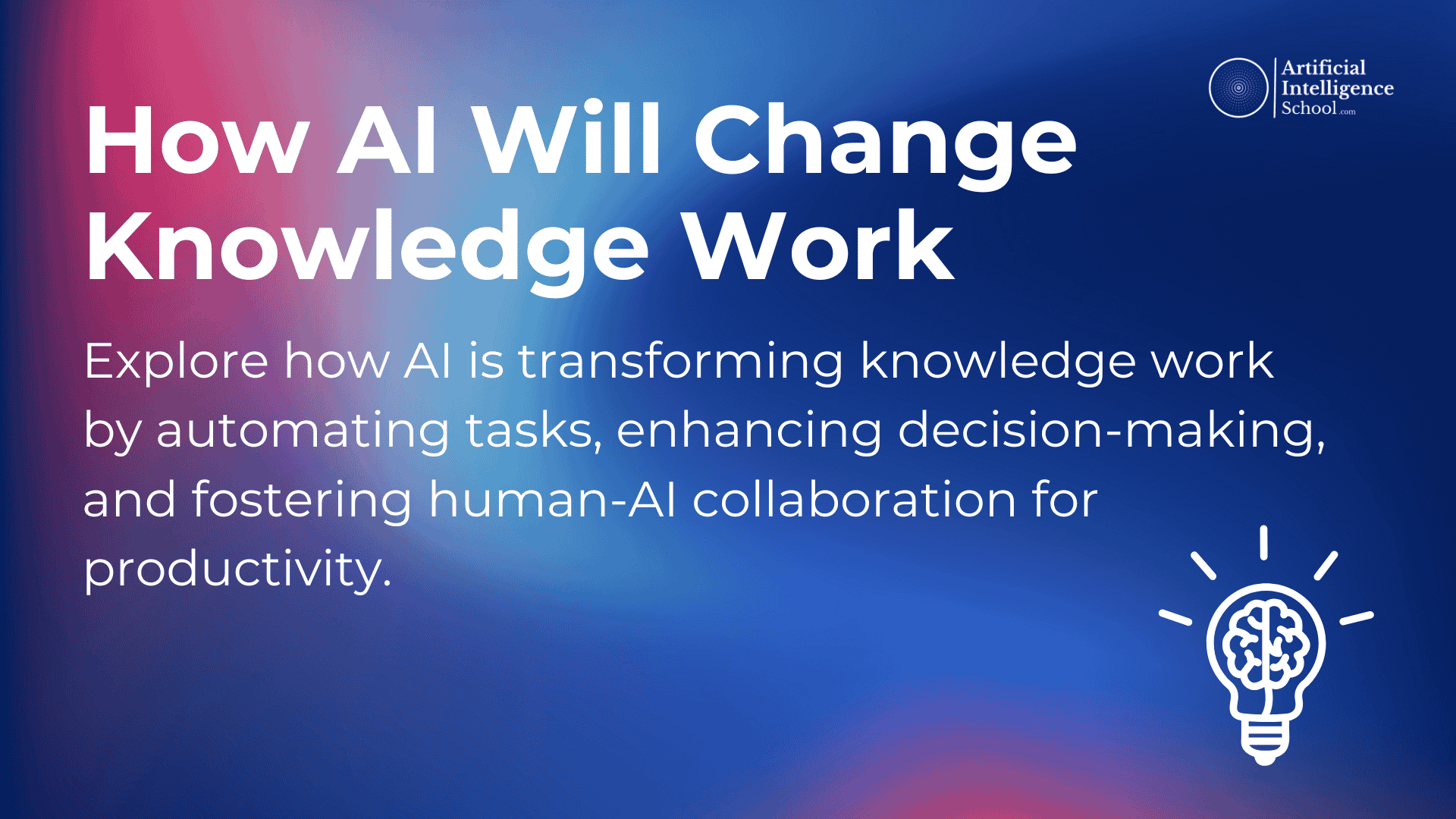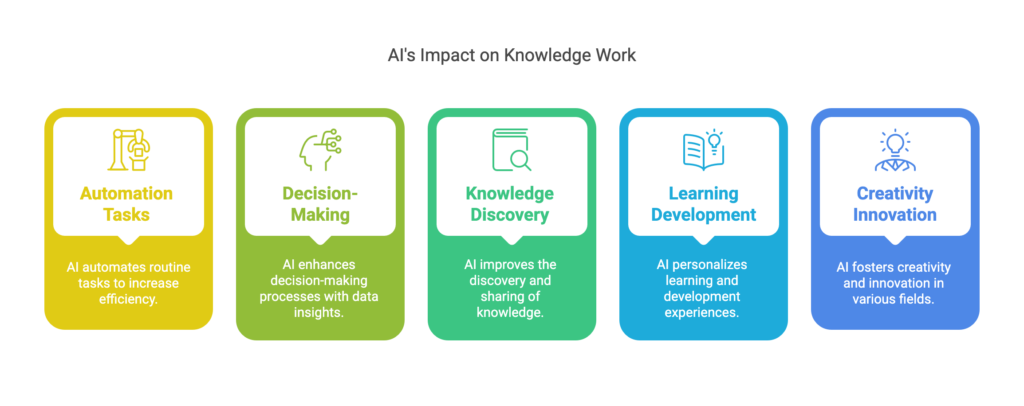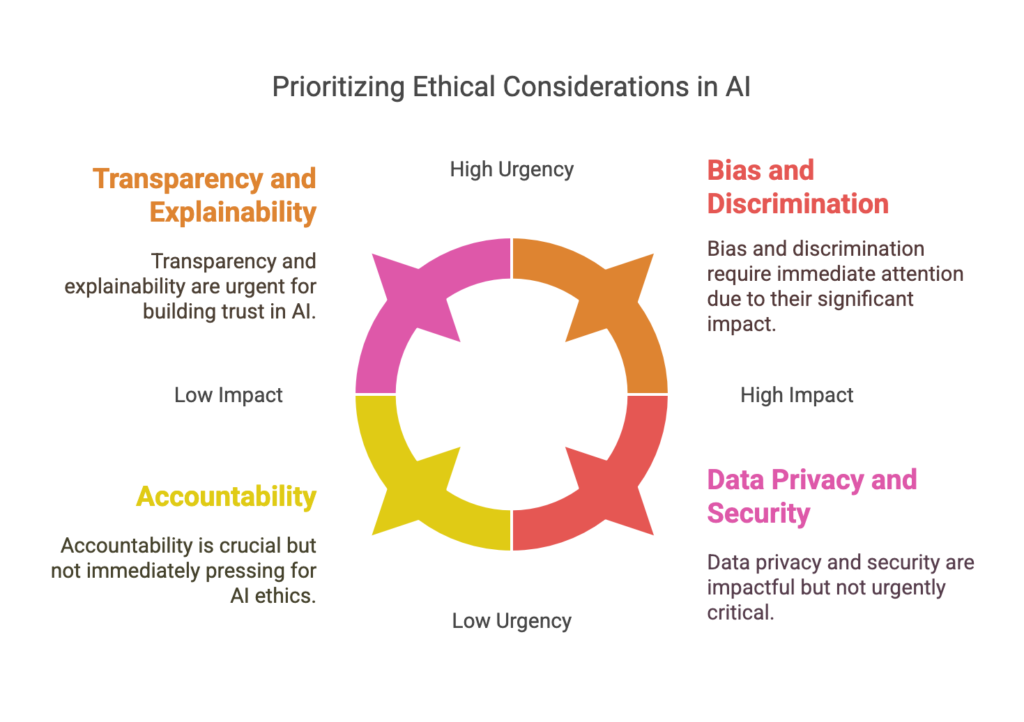How AI Will Change Knowledge Work

- The Rise of AI in the Workplace
- AI's Impact on Knowledge Work: A Detailed Examination
- Case Studies: AI in Action
- The Challenges and Ethical Implications of AI in Knowledge Work
- Ethical Considerations in AI-Powered Knowledge Work
- The Future of Knowledge Work: A Collaborative Approach
- Synthesis and Conclusion
- Works cited
Artificial intelligence (AI) is rapidly transforming the way we live and work 1. While AI is often associated with robots and self-driving cars, its impact on knowledge work is just as significant. Knowledge work, encompassing tasks that demand intellectual effort, specialized skills, and creative problem-solving, forms the core of numerous industries, from finance and healthcare to technology and education. This article delves into how AI is revolutionizing knowledge work, drawing upon studies, data, case studies, and expert opinions to provide a comprehensive overview of this transformative technology. It’s important to recognize that AI is not merely automating tasks but also automating cognitive functions, a development with the potential to surpass even the most significant technological innovations of the past 1.
The Rise of AI in the Workplace
AI is no longer a futuristic concept; it’s already a reality in many workplaces. A recent Microsoft study revealed that a staggering 75% of knowledge workers are already integrating AI tools into their daily tasks 2. This rapid adoption is fueled by AI’s capacity to automate routine tasks, analyze vast amounts of data, and generate valuable insights that enhance productivity and decision-making. Notably, a significant portion of these workers – 78% – are bringing their own AI tools to work (BYOAI) rather than relying on company-provided solutions 3. This trend underscores the swift embrace of AI by employees and potentially indicates a disconnect between what companies offer and what employees find useful.
Several factors contribute to this widespread adoption of AI. One is the increasing availability of sophisticated AI models. Large language models (LLMs) like OpenAI’s GPT-4 are exhibiting remarkable capabilities, such as achieving scores in the top 10% of test takers on the Uniform Bar Examination and accurately answering 90% of questions on the US Medical Licensing Examination 1. These advancements are blurring the lines between human and artificial intelligence, paving the way for a new era of work where humans and AI collaborate seamlessly.
Furthermore, the increasing pressure on knowledge workers is a key driver of AI adoption. 68% of employees report feeling overwhelmed by their workloads 3, and AI is increasingly seen as a solution to manage this burden by automating repetitive tasks and allowing workers to focus on higher-value activities like creativity, strategy, and collaboration.
However, it’s crucial to acknowledge the uneven adoption and impact of AI across different industries and work processes, a concept known as the “jagged technological frontier” 4. While some sectors are rapidly integrating AI, others are lagging behind, creating a disparity in how this technology is being utilized.
AI’s Impact on Knowledge Work: A Detailed Examination
AI’s impact on knowledge work is multifaceted, with potential benefits and challenges across various domains. Let’s explore some of the key ways AI is transforming knowledge work:

AI-Powered Automation of Routine Tasks
One of the most significant benefits of AI is its ability to automate mundane and repetitive tasks. This liberation allows knowledge workers to dedicate their time and energy to more strategic, creative, and complex aspects of their roles. For example, in finance, AI algorithms can analyze massive datasets to automatically generate insights, flag anomalies, and even execute trades 5. In journalism, AI can assist in generating articles, summaries, and reports, enabling human journalists to focus on in-depth investigative reporting and adding a human touch to the final product 5. It’s important to note that while AI can generate these types of content, human oversight and editing remain crucial to ensure accuracy, quality, and ethical considerations.
Enhancing Decision-Making with AI
AI empowers knowledge workers with powerful tools to enhance their decision-making capabilities. AI algorithms can analyze data, identify trends, and provide recommendations that consider a broader range of factors than humans can typically process 6. This leads to more informed and data-driven decisions, ultimately improving efficiency and outcomes 4.
Improving Knowledge Discovery and Sharing through AI
AI-powered knowledge management systems are transforming how organizations capture, store, and share information. These systems use AI to automatically categorize and tag information, making it easily searchable and accessible to employees 7. AI also enhances search capabilities by understanding the context and intent behind queries, providing more accurate and relevant results 7. Moreover, AI can improve knowledge management by generating insights from large datasets and identifying patterns that humans might miss 7.
Personalizing Learning and Development with AI
AI is revolutionizing enterprise learning by providing personalized learning experiences. AI-powered learning platforms can adapt to individual learning styles, provide customized feedback, and recommend relevant content 8. This personalized approach improves knowledge retention and accelerates skill development.
Fostering Creativity and Innovation with AI
While some fear that AI will stifle creativity, it can actually enhance it. AI tools can generate ideas, suggest solutions, and assist in content creation, providing knowledge workers with new avenues for exploration and innovation 6.
It’s worth noting that while knowledge workers are embracing AI to improve their work, their usage patterns sometimes differ from how business leaders envision AI’s role. For instance, a study found that nearly two-thirds of employees primarily use AI to double-check their work, while most enterprises deploy AI to assist with initial research, workflow management, and data analysis 9. This discrepancy highlights the need for better alignment between employee and employer expectations regarding AI usage.
Case Studies: AI in Action
The following table showcases how AI is already transforming knowledge work across various industries:
| Company/Industry | AI Application | Key Results |
|---|---|---|
| Global Technology Firm | AI-powered learning platform for employee training | 40% increase in course completion rates; 25% improvement in employee satisfaction with training programs; 15% reduction in time-to-proficiency for new hires 8 |
| Healthcare Provider | AI-powered learning system for medical staff training | 30% reduction in training time; 50% boost in knowledge retention; 20% improvement in patient care quality 8 |
| Consulting Firm | AI tools to enhance consultant productivity and work quality | Consultants using AI support completed tasks 25.1% more quickly and produced work that was more than 40% higher in quality compared to those without AI assistance 4 |
These examples demonstrate the tangible benefits of AI adoption in knowledge work, leading to increased efficiency, improved learning outcomes, and enhanced work quality.
The Challenges and Ethical Implications of AI in Knowledge Work
While AI offers numerous benefits, it also presents challenges and ethical considerations that need to be addressed:
Job Displacement
One of the primary concerns surrounding AI is the potential for job displacement. As AI automates routine tasks, some knowledge workers may find their roles redundant. However, experts believe that AI is more likely to reshape knowledge work rather than eliminate it entirely 6. This reshaping may disproportionately affect white-collar jobs, particularly those requiring higher education 10. Knowledge workers will need to adapt and acquire new skills to remain relevant in the changing job market.
Bias and Fairness
AI algorithms can perpetuate biases present in the data they are trained on. This can lead to unfair or discriminatory outcomes, particularly in areas like hiring and lending 11. Organizations need to ensure that their AI systems are designed and implemented ethically, with safeguards against bias and discrimination.
Data Privacy and Security
AI systems often rely on vast amounts of data, raising concerns about privacy and security. Organizations must implement robust data protection measures to prevent breaches and ensure compliance with data protection regulations 12.
Loss of Human Touch
In some knowledge work domains, such as healthcare and counseling, the human touch is essential. While AI can assist in these areas, it cannot fully replace human empathy and emotional intelligence 6.
Ethical Dilemmas
The use of AI in knowledge work can raise ethical dilemmas, particularly in professions like law and medicine, where decisions have significant consequences. Organizations need to establish clear ethical guidelines and ensure human oversight in AI-driven decision-making 6.
Ethical Considerations in AI-Powered Knowledge Work
Beyond the specific challenges mentioned above, the integration of AI in knowledge work raises broader ethical considerations that require careful attention. These considerations include:
- Bias and Discrimination: AI systems can inherit and amplify biases present in the data they are trained on, leading to unfair or discriminatory outcomes. This necessitates careful data selection, algorithmic design, and ongoing monitoring to mitigate bias and ensure fairness 12.
- Transparency and Explainability: It’s crucial for AI systems to be transparent and explainable, meaning that users should be able to understand how AI arrives at its decisions. This transparency fosters trust and accountability, especially in situations where AI is used for critical decision-making 13.
- Data Privacy and Security: AI systems often rely on vast amounts of data, raising concerns about privacy and security. Organizations must prioritize data protection, implement robust security measures, and ensure compliance with data privacy regulations 14.
- Accountability: Clear lines of accountability need to be established for AI-driven decisions and actions. This includes determining who is responsible when AI systems make errors or cause harm 14.
Addressing these ethical considerations requires a multi-faceted approach, involving diverse teams, ethical AI standards, and a culture of responsible AI development and deployment.

The Future of Knowledge Work: A Collaborative Approach
The future of knowledge work lies in a collaborative approach where humans and AI work together, leveraging each other’s strengths. AI will handle routine tasks, analyze data, and provide insights, while humans will focus on creativity, critical thinking, and complex problem-solving. This collaboration will lead to a more efficient, productive, and innovative workforce.
Interestingly, this collaborative future may also reshape the relationship between knowledge work and the physical workplace. As AI tools become more sophisticated, knowledge workers may have greater flexibility in where and how they work 15. This could lead to more remote work options and a greater emphasis on outcomes rather than physical presence.
To prepare for this future, knowledge workers need to embrace lifelong learning and develop AI fluency. Organizations need to invest in AI training and provide employees with the tools and resources they need to thrive in an AI-powered workplace. By addressing the challenges and ethical implications of AI, we can harness its transformative potential to create a better future of work for everyone. It’s important to recognize that the future of knowledge work will require a balance between human expertise and AI capabilities 13.
A crucial aspect of this future is the need for continuous learning. As AI evolves, knowledge workers will need to adapt and acquire new skills to remain competitive 16. This includes developing a deeper understanding of AI concepts, data analysis techniques, and ethical considerations.
Furthermore, it’s important to acknowledge the paradox that while many workers fear AI will replace their jobs, most leaders wouldn’t hire someone without AI skills 3. This highlights the urgent need for AI skills development and the growing importance of AI literacy in the job market.
Synthesis and Conclusion
AI is revolutionizing knowledge work, automating tasks, enhancing decision-making, and fostering creativity. While challenges and ethical considerations exist, a collaborative approach where humans and AI work together will unlock the full potential of this transformative technology. By embracing lifelong learning and ethical AI practices, we can create a future of work that is more efficient, productive, and fulfilling for all.
The table below summarizes some of the key benefits and challenges of AI in knowledge work:
| Benefit | Challenge | Example |
|---|---|---|
| Increased efficiency and productivity | Job displacement | AI-powered automation may lead to job losses in sectors with a high degree of routine tasks. |
| Enhanced decision-making | Bias and fairness | AI algorithms used in hiring processes can perpetuate existing biases if not carefully designed and monitored. |
| Improved knowledge discovery and sharing | Data privacy and security | AI-powered knowledge management systems require robust security measures to protect sensitive information. |
| Personalized learning and development | Loss of human touch | While AI can personalize learning, it cannot replace the human element in fields like counseling or therapy. |
| Fostering creativity and innovation | Ethical dilemmas | The use of AI in creative fields raises questions about ownership, copyright, and the potential for misuse. |
The integration of AI in knowledge work presents both exciting opportunities and significant challenges. By actively engaging in discussions about AI ethics, promoting responsible AI development, and investing in AI skills development, we can navigate this transformative era and create a future of work that benefits everyone.
Works cited
1. Superagency in the workplace: Empowering people to unlock AI’s full potential – McKinsey & Company, accessed February 8, 2025, https://www.mckinsey.com/capabilities/mckinsey-digital/our-insights/superagency-in-the-workplace-empowering-people-to-unlock-ais-full-potential-at-work
2. Microsoft study: 75% of knowledge workers using AI at work, nearly doubling in six months, accessed February 8, 2025, https://www.geekwire.com/2024/microsoft-study-finds-75-of-knowledge-workers-using-ai-at-work-nearly-doubling-in-six-months/
3. AI Stats and Work Trends 2024: Microsoft Work Trend Index Analysis + Podcast – Bubbles, accessed February 8, 2025, https://www.usebubbles.com/blog/ai-stats-and-work-trends-2024
4. Results from Recent Experimentation of the Effects of AI on Knowledge Worker Productivity: Insights into Enhanced Consulting Efficiency | by Sabine VanderLinden | Medium, accessed February 8, 2025, https://medium.com/@sabine_vdl/results-from-recent-experimentation-of-the-effects-of-ai-on-knowledge-worker-productivity-insights-e12fa058a0b1
5. Artificial Intelligence and the Knowledge Worker – Arion Research LLC, accessed February 8, 2025, https://www.arionresearch.com/blog/hnn05h38h9ikmyx980tmjvngtwun38
6. Will Artificial Intelligence Eliminate Knowledge Work? – M-Files, accessed February 8, 2025, https://www.m-files.com/blog/articles/will-artificial-intelligence-eliminate-knowledge-work/
7. Benefits of AI in knowledge management for enterprises | Market Logic, accessed February 8, 2025, https://marketlogicsoftware.com/blog/benefits-of-ai-in-knowledge-management-for-enterprises/
8. AI Enterprise Learning Case Studies: Success Stories – Hyperspace, accessed February 8, 2025, https://hyperspace.mv/case-studies-of-ai-implementation-in-enterprise-learning/
9. Knowledge workers lean on AI as workloads increase – CIO Dive, accessed February 8, 2025, https://www.ciodive.com/news/knowledge-workers-AI-use-drudge-work-priorities-Wrike/729255/
10. Insights on Generative AI and the Future of Work | NC Commerce, accessed February 8, 2025, https://www.commerce.nc.gov/news/the-lead-feed/generative-ai-and-future-work
11. The Ethical Considerations of Artificial Intelligence | Washington D.C. & Maryland Area, accessed February 8, 2025, https://www.captechu.edu/blog/ethical-considerations-of-artificial-intelligence
12. Ethics and Costs – Generative AI – Research Guides at Amherst College, accessed February 8, 2025, https://libguides.amherst.edu/c.php?g=1350530&p=9969379
13. What Is AI ethics? The role of ethics in AI – SAP, accessed February 8, 2025, https://www.sap.com/resources/what-is-ai-ethics
14. The Role of Ethical Artificial Intelligence in Knowledge Management – Bloomfire, accessed February 8, 2025, https://bloomfire.com/blog/ethical-artificial-intelligence-in-knowledge-management/
15. The Future of Knowledge Work and “Place” | pagethink.com, accessed February 8, 2025, https://www.pagethink.com/publication/2024/future-knowledge-work-and-place16. The AI-Powered Knowledge Worker: Enhancing Productivity – RTS Labs, accessed February 8, 2025, https://rtslabs.com/ai-powered-knowledge-worker


